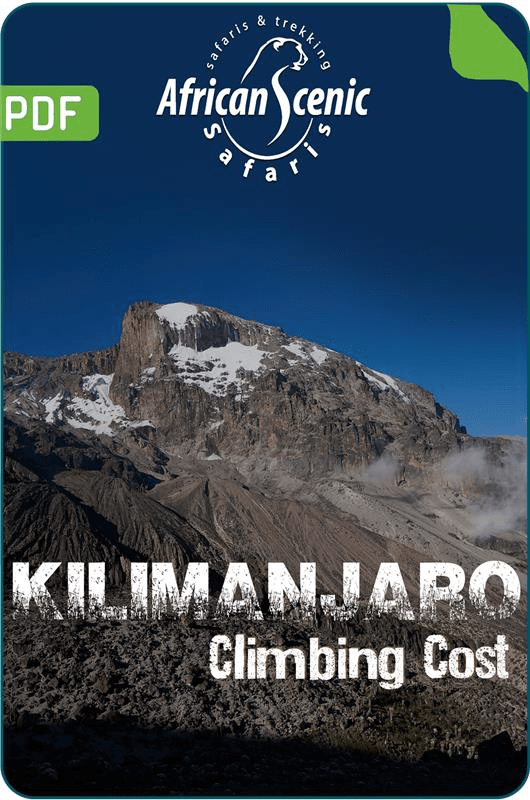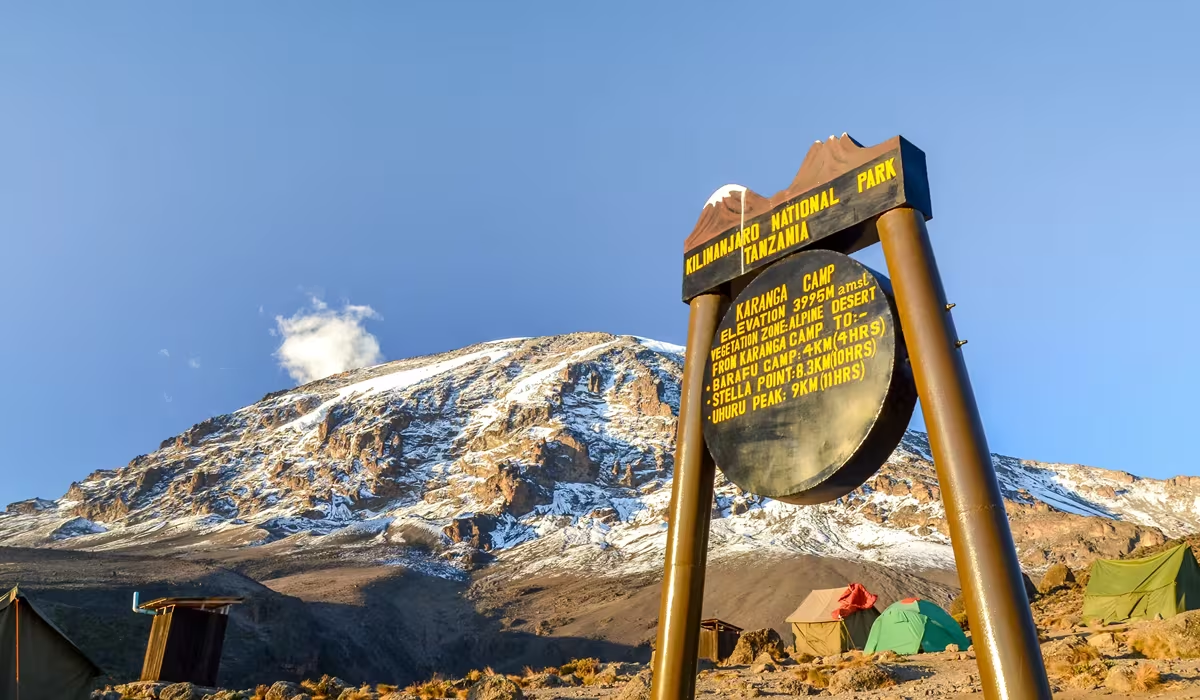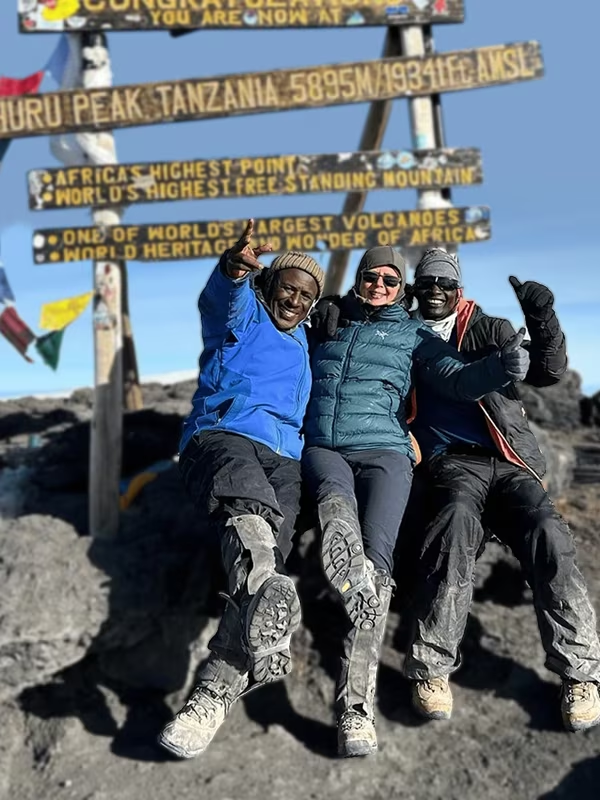Kilimanjaro Height
Mount Kilimanjaro Height, standing at 5,895 meters (19,341 feet) above sea level, represents Africa's grandeur and challenges adventurers to reach new heights. Beyond its soaring elevation, discover the details of each of Kilimanjaro's three cones, the mountain's prominence, and the high-altitude related questions in the subsequent sections that follow....
Mt Kilimanjaro’s Elevation
The Kilimanjaro Height in Feet, i.e., 19,341 above sea level is living proof of the grand scale of nature. This towering stratovolcano emerges majestically from the Tanzanian plains, dominating the skyline and inviting adventurers from all corners of the globe. Here’s a representation going over all the essential things regarding the Mt Kilimanjaro Elevation and some related characteristic features of the mountain:
| FEATURE |
DETAILS |
| Elevation |
5,895 meters (19,341 ft) |
| Location |
Tanzania, East Africa |
| Prominence |
5,885 meters (19,298 ft) |
| Coordinates |
3.0674° S, 37.3556° E |
| Formation |
Stratovolcano |
| First Ascent |
1889 by Hans Meyer |
| Climbing Difficulty |
Moderate to Strenuous |
As you ascend during Climbing Mt Kilimanjaro, elevation becomes a tangible force. It leads climbers through lush montane forests, into the barren landscapes of the alpine desert, and ultimately to the glacial summit. Each step taken at this Mt Kilimanjaro Height is a journey into thinning air, where the oxygen is infrequent.
Kilimanjaro’s Height and elevation that reaches the sky offers adventurers an extraordinary journey of altitude, discovery, and the relentless pursuit of the summit.
The Altitude Of Kilimanjaro’s Three Cones
Kilimanjaro is a mountain of many faces, with three primary volcanic cones adding to Height of Kilimanjaro.
- Kibo, the highest and most famous, soars to an impressive altitude of 5,895 meters (19,341 feet).
- Its snow-capped summit, known as Uhuru Peak, is the ultimate goal for climbers seeking to conquer Africa's highest point.
- Mawenzi, the second-highest cone, stands proudly at 5,149 meters (16,893 feet).
- With its rugged and jagged terrain, it presents a challenging climb for the daring few who venture to its heights.
Lastly, Shira, the oldest of the three, offers a different perspective at 3,962 meters (12,966 feet). It also serves as a plateau for trekkers to acclimatize to the Mount Kilimanjaro Height before proceeding higher.
The Significance Of Altitude
Altitude on Kilimanjaro is far more than a numerical figure. It's an elemental force that transforms the very core of a Mount Kilimanjaro Climbing journey. As you ascend into higher altitudes, the air grows thinner, temperatures drop, and the landscape undergoes a dramatic conversion.
Below are the different Kilimanjaro Altitude Zones, their exact heights, and characteristics:
| ALTITUDE ZONE |
HEIGHT |
CHARACTERISTICS |
| Lowland |
1,000 - 1,500 meters (3,280 - 4,921 feet) |
Starting Point for Climbing |
| Montane Forest |
1,500 - 2,800 meters (4,921 - 9,186 feet) |
Diverse Flora and Fauna |
| Heath and Moorland |
2,800 - 4,000 meters (9,186 - 13,123 feet) |
Unique Alpine Vegetation |
| Alpine Desert |
4,000 - 5,000 meters (13,123 - 16,404 feet) |
Drastic Altitude Changes |
| Arctic Zone |
Above 5,000 meters (16,404 feet and higher) |
Snow and Ice Fields |
A Kilimanjaro Trek is all about embracing the profound changes in terrain, climate, and personal perspective that altitude grants upon you.
High-Altitude Acclimatization
As climbers ascend, their body faces the challenge of adapting to decreasing oxygen levels. This involves strategically planned stops at progressively higher camps on the mountain. Below are some acclimatization guidelines according to varying Height of Kilimanjaro:
| ALTITUDE (in metres) |
ACCLIMATIZATION GUIDELINES |
WHY IT MATTERS |
| 2,000 - 3,000 |
Spend a day or more for initial acclimatization |
A means to Adjust to Altitude Change |
| 3,000 - 4,000 |
Ascend slowly, avoid strenuous activity |
Improves Oxygen Uptake |
| Above 4,000 |
Gain no more than 300-500 meters per day |
Prevents Altitude Sickness |
| Above 5,000 |
Consider extra acclimatization days |
Enhances Chance of Summit Success |
Scenic’s Altitude Verdict – It's about learning to listen to your body, understanding its unique response to altitude, and giving it ample time needed to adjust. It's also about ensuring your safety and the success of your summit attempt, making each acclimatization day a valuable step toward the ultimate goal.
Kilimanjaro Elevation Gain
The Mt Kilimanjaro Elevation gain is a remarkable feat of endurance and willpower. Starting from the lush greenery of the Tanzanian lowlands, climbers gradually ascend to the snow-covered summit, gaining approximately 4,900 meters (16,000 feet) in elevation along the way.
This dramatic elevation gain defines the Kilimanjaro experience. It's not just about reaching the top because the appeal also lies in the journey itself. It includes the transition from tropical rainforests to arctic glaciers, the changing landscapes, and the personal growth that comes with every step gained in Kilimanjaro Elevation.
Kilimanjaro Height Vs Elevation Vs Prominence Vs Climbing Height
Understanding the distinctions between Kilimanjaro's height, elevation, prominence, and climbing height is essential for appreciating the multifaceted nature of Africa's tallest mountain. Here’s a representation of all the Kilimanjaro metrics:
| METRIC |
DESCRIPTION |
| Height |
Kilimanjaro's peak-to-base measurement (5,895m) |
| Elevation |
Height above sea level (5,895m) |
| Prominence |
Height above surrounding terrain (5,885m) |
| Climbing Height |
Elevation gain from base to summit (Approx. 4,900m) |
Kilimanjaro Height is Where Earth Meets the Sky
At its core, the towering Kilimanjaro Height defines the essence of Africa's highest peak. With its unique cones, prominence, and varied climbing routes, Kilimanjaro offers an expedition like no other. It's a Mount Kilimanjaro Climbing journey of elevation, both in altitude and personal experience, waiting to become a part for the intrepid souls.
Explore Kilimanjaro Travel Guide
Find essential topics below to help you plan, prepare, and enjoy your Kilimanjaro travel experience fully.
Climb Kilimanjaro With Us
Get ready for a mountain adventure with real advice, smiling guides, and simple help that actually works. We’re with you from start to summit.
Frequently Asked Questions
Kilimanjaro Height stands at a towering 5,895 meters (19,341 feet) above sea level, making it Africa's highest peak.
Kilimanjaro is the tallest mountain in Africa and the Kilimanjaro Height Ranking is the fourth highest of the Seven Summits. When measured from the Earth's core, it's the sixth largest in the world.
Kilimanjaro comprises three volcanic cones: Kibo (5,895 meters), Mawenzi (5,149 meters), and Shira (3,962 meters), each offering unique landscapes and challenges.
Kilimanjaro's prominence is 5,885 meters (19,298 feet), signifying the Kilimanjaro Summit Height above the surrounding terrain.
Climbers gain an elevation of approximately 4,900 meters (16,000 feet) from the base to the summit, experiencing diverse altitudes along different routes.
Acclimatization is essential. Spend extra days ascending gradually, stay hydrated, and listen to your body to adapt to decreasing oxygen levels.
Yes, the Mount Kilimanjaro Height includes its entire peak-to-base measurement, offering a comprehensive perspective of its grandeur.
Kilimanjaro's altitude contributes to distinct climatic zones, from tropical rainforests to alpine deserts, creating varied weather conditions during the ascent.
Yes, high altitudes can lead to altitude sickness during a Kilimanjaro Climb. Proper acclimatization and experienced guides are important for the safety of climbers.
Challenges include lower oxygen levels, cold temperatures, and increased physical demands, requiring climbers to be well-prepared.
Simbo Natai, founder of African Scenic Safaris, crafts sustainable, meaningful Tanzanian journeys rooted in his deep local knowledge and passion.
Director
























 African Scenic Safaris #1 on TripAdvisor
African Scenic Safaris #1 on TripAdvisor 




